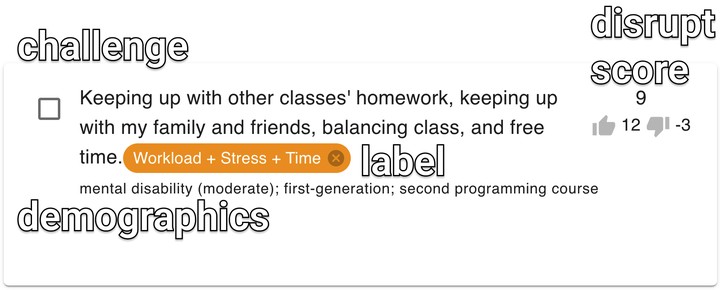Surfacing Equity Issues in Large Computing Courses with Peer-Ranked, Demographically-Labeled Student Feedback
 Contextualized student feedback enabled teaching teams to perspective take and consider minoritized perspectives.
Contextualized student feedback enabled teaching teams to perspective take and consider minoritized perspectives.Abstract
As computing courses become larger, students of minoritized groups continue to disproportionately face challenges that hinder their academic and professional success (e.g. implicit bias, microaggressions, lack of resources, assumptions of preparatory privilege). This can impact career aspirations and sense of belonging in computing communities. Instructors have the power to make immediate changes to support more equitable learning, but they are often unaware of students’ challenges. To help both instructors and students understand the inequities in their classes, we developed StudentAmp, an interactive system that uses student feedback and self-reported demographic information (e.g. gender, ethnicity, disability, educational background) to show challenges and how they affect students differently. To help instructors make sense of feedback, StudentAmp ranks challenges by student-perceived disruptiveness. We conducted formative evaluations with five large college computing courses (150 - 750 students) being taught remotely during the COVID-19 pandemic. We found that students shared challenges beyond the scope of the course, perceived sharing information about who they were as useful but potentially dangerous, and that teaching teams were able to use this information to consider the positionality of students sharing challenges. Our findings relate to a central design tension of supporting equity by sharing contextualized information about students while also ensuring their privacy and well-being.
Students face challenges that are often invisible to their instructors or even themselves! This project investigates how to use student feedback to identify challenges faced by the most underserved learners in computing courses. We are designing and developing ways to interact and use data-driven tools to address rather than exacerbate equity issues in the complex domain of computing education.
By developing tools that enable students to effortlessly and privately share their course experiences and empower both students and instructors to interpret contextualized data to understand experiences of under-served learners, we can help make computing courses more equitable learning environments.
Try StudentAmp out at StudentAmp.com.
This project is in collaboration with the UW College of Education and UW Office for the Advancement of Engineering Teaching & Learning. It is funded by grants from the National Science Foundation and Google Cloud.
🏅 Awarded Recognition for Contribution to Diversity and Inclusion at the 25th ACM Conference On Computer-Supported Cooperative Work And Social Computing (CSCW 2022).